The success of sci-fi has all too often been attributed to “special effects to drool over”. Although SFX are entertaining, what I think makes a good sci-fi movie is one that tackles issues concerning where our present society is going and the state of human morality. The writer/director Andrew Niccol draws a sinisterly thin line between the scientific reality of today and Nazi blood politics.
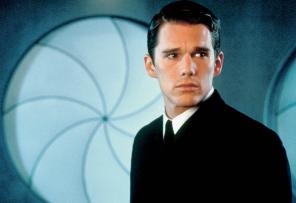
In a world where the potential for disease, defects and aptitudes can be fully determined right at birth, the parents of Vincent Freeman chose to have a child the ‘old-fashioned way’ by chance. The result is Vincent (Ethan Hawke) a ‘god-child’, a ‘faith-birth’ and… an In-Valid. With his inferior genes, Vincent is destined to do menial jobs for the rest of his life.
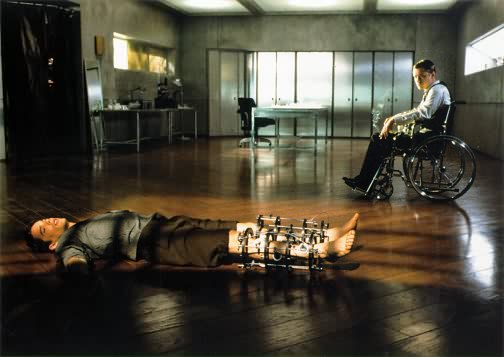
Vincent and his genetically perfect younger brother Anton constantly compete in swim races, and invariably Vincent looses due to his weaker heart. One day though Vincent beats his brother in the race. Vincent leaves home and becomes a cleaner at Gattaca Corp., a space exploration agency. Everyday he watches the manned missions take off to Titan, knowing that with his ‘inferior’ blood, he could never ever be on one of those missions.
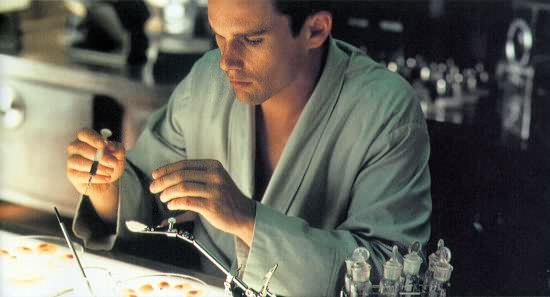
Determined as ever though he switches identities with a paraplegic super-athlete Jerome (Jude Law) and successfully applies to Gattaca. Shortly before his launch date however, a director at Gattaca is brutally murdered. The subsequent investigation threatens to uncover his deception and tear down his dreams.
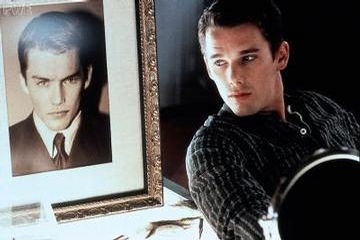
This film is a compelling view of a future marred by genetic discrimination, and one man’s struggle to overcome the system. It seems that just as society gets over one form of prejudice (sexism, racism, homophobia) it invents and holds on firmly to a new form (genoism).
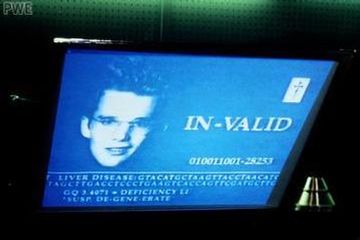
What makes the film is it’s attention to detail, the thoroughness, and thoughtfulness with which such a society is shown, and the lengths that have to be gone to in an attempt to fool it. Everyone at Gattaca has to undergo near-continuous DNA and urine tests, and it is fun to see the lengths that Vincent has to go to in order to successfully pass all these tests – fake fingertips with blood samples included, removing all loose skin and hair at the start of each day to minimise the risk of one follicle, eyelash or skin-flake giving away your genetic identity, vacuuming your keyboard and then sprinkling fake skin cells in the gaps, fake urine samples (which have to be given in front of the tester), and fake blood samples (drawn directly from the vein).

It is Jude Law who really shines in this character driven film, as the disheartened ‘super-man’, who tried to commit suicide after coming second in a swimming contest. His broken back could be healed, but he would have to continue living his life just like an In-Valid . Instead he chooses to live it as an invalid (to be more politically correct but less aptly linked, ‘as a person with a disability’).
As the relationship between Vincent and Jerome grows, the contrasts between the two characters become more starkly portrayed. Jerome is the self-pronounced failure, although impeccably engineered to be perfect; Vincent is relentlessly determined to reach his goal, despite being written off at birth as unacceptably imperfect.
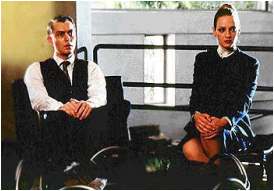
Even without special effects, this film is more than strong enough to grab full attention and hold it for 112 minutes. It indirectly tackles the key ethical issues arising from DNA manipulation that have been debated since the latter part of the last century, such as cloning, GM foods, designer babies and the like. It also directly introduces us to the potential offspring of these issues including biological apartheid and genoism.
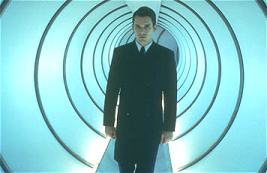
In summery, unlike the Orwellian future that Gattaca invokes, choices are not mandated by an ubiquitous Big Brother figure selectively screening people. They are made by loving parents, who want to give their children the best chances in life. It is completely credible that a parent would want to eliminate a child’s tendencies toward cancer or heart defects. Is it that far a leap to also eliminate the need for glasses or tendencies to obesity, addiction, or even left-handedness? Is it a giant leap or merely a small step to pre-program eye-colour, hair-colour, intelligence, or even a preferred career choice?… Where would it end?… Where will it end?…

